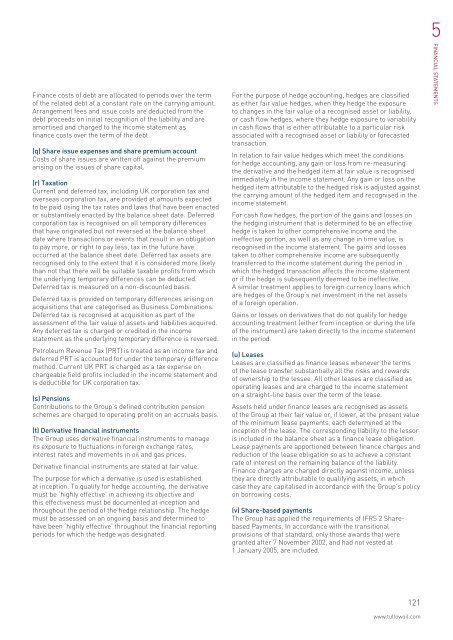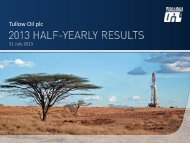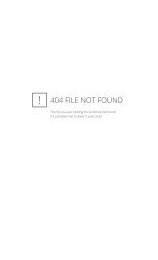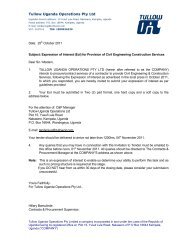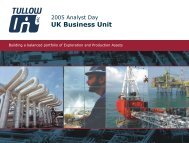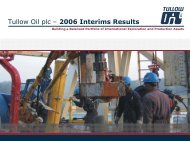2011 Annual Report PDF - Tullow Oil plc
2011 Annual Report PDF - Tullow Oil plc
2011 Annual Report PDF - Tullow Oil plc
Create successful ePaper yourself
Turn your PDF publications into a flip-book with our unique Google optimized e-Paper software.
5<br />
Finance costs of debt are allocated to periods over the term<br />
of the related debt at a constant rate on the carrying amount.<br />
Arrangement fees and issue costs are deducted from the<br />
debt proceeds on initial recognition of the liability and are<br />
amortised and charged to the income statement as<br />
finance costs over the term of the debt.<br />
(q) Share issue expenses and share premium account<br />
Costs of share issues are written off against the premium<br />
arising on the issues of share capital.<br />
(r) Taxation<br />
Current and deferred tax, including UK corporation tax and<br />
overseas corporation tax, are provided at amounts expected<br />
to be paid using the tax rates and laws that have been enacted<br />
or substantively enacted by the balance sheet date. Deferred<br />
corporation tax is recognised on all temporary differences<br />
that have originated but not reversed at the balance sheet<br />
date where transactions or events that result in an obligation<br />
to pay more, or right to pay less, tax in the future have<br />
occurred at the balance sheet date. Deferred tax assets are<br />
recognised only to the extent that it is considered more likely<br />
than not that there will be suitable taxable profits from which<br />
the underlying temporary differences can be deducted.<br />
Deferred tax is measured on a non-discounted basis.<br />
Deferred tax is provided on temporary differences arising on<br />
acquisitions that are categorised as Business Combinations.<br />
Deferred tax is recognised at acquisition as part of the<br />
assessment of the fair value of assets and liabilities acquired.<br />
Any deferred tax is charged or credited in the income<br />
statement as the underlying temporary difference is reversed.<br />
Petroleum Revenue Tax (PRT) is treated as an income tax and<br />
deferred PRT is accounted for under the temporary difference<br />
method. Current UK PRT is charged as a tax expense on<br />
chargeable field profits included in the income statement and<br />
is deductible for UK corporation tax.<br />
(s) Pensions<br />
Contributions to the Group’s defined contribution pension<br />
schemes are charged to operating profit on an accruals basis.<br />
(t) Derivative financial instruments<br />
The Group uses derivative financial instruments to manage<br />
its exposure to fluctuations in foreign exchange rates,<br />
interest rates and movements in oil and gas prices.<br />
Derivative financial instruments are stated at fair value.<br />
The purpose for which a derivative is used is established<br />
at inception. To qualify for hedge accounting, the derivative<br />
must be ‘highly effective’ in achieving its objective and<br />
this effectiveness must be documented at inception and<br />
throughout the period of the hedge relationship. The hedge<br />
must be assessed on an ongoing basis and determined to<br />
have been ‘highly effective’ throughout the financial reporting<br />
periods for which the hedge was designated.<br />
For the purpose of hedge accounting, hedges are classified<br />
as either fair value hedges, when they hedge the exposure<br />
to changes in the fair value of a recognised asset or liability,<br />
or cash flow hedges, where they hedge exposure to variability<br />
in cash flows that is either attributable to a particular risk<br />
associated with a recognised asset or liability or forecasted<br />
transaction.<br />
In relation to fair value hedges which meet the conditions<br />
for hedge accounting, any gain or loss from re-measuring<br />
the derivative and the hedged item at fair value is recognised<br />
immediately in the income statement. Any gain or loss on the<br />
hedged item attributable to the hedged risk is adjusted against<br />
the carrying amount of the hedged item and recognised in the<br />
income statement.<br />
For cash flow hedges, the portion of the gains and losses on<br />
the hedging instrument that is determined to be an effective<br />
hedge is taken to other comprehensive income and the<br />
ineffective portion, as well as any change in time value, is<br />
recognised in the income statement. The gains and losses<br />
taken to other comprehensive income are subsequently<br />
transferred to the income statement during the period in<br />
which the hedged transaction affects the income statement<br />
or if the hedge is subsequently deemed to be ineffective.<br />
A similar treatment applies to foreign currency loans which<br />
are hedges of the Group’s net investment in the net assets<br />
of a foreign operation.<br />
Gains or losses on derivatives that do not qualify for hedge<br />
accounting treatment (either from inception or during the life<br />
of the instrument) are taken directly to the income statement<br />
in the period.<br />
(u) Leases<br />
Leases are classified as finance leases whenever the terms<br />
of the lease transfer substantially all the risks and rewards<br />
of ownership to the lessee. All other leases are classified as<br />
operating leases and are charged to the income statement<br />
on a straight-line basis over the term of the lease.<br />
Assets held under finance leases are recognised as assets<br />
of the Group at their fair value or, if lower, at the present value<br />
of the minimum lease payments, each determined at the<br />
inception of the lease. The corresponding liability to the lessor<br />
is included in the balance sheet as a finance lease obligation.<br />
Lease payments are apportioned between finance charges and<br />
reduction of the lease obligation so as to achieve a constant<br />
rate of interest on the remaining balance of the liability.<br />
Finance charges are charged directly against income, unless<br />
they are directly attributable to qualifying assets, in which<br />
case they are capitalised in accordance with the Group’s policy<br />
on borrowing costs.<br />
(v) Share-based payments<br />
The Group has applied the requirements of IFRS 2 Sharebased<br />
Payments. In accordance with the transitional<br />
provisions of that standard, only those awards that were<br />
granted after 7 November 2002, and had not vested at<br />
1 January 2005, are included.<br />
FINANCIAL STATEMENTS<br />
121<br />
www.tullowoil.com


